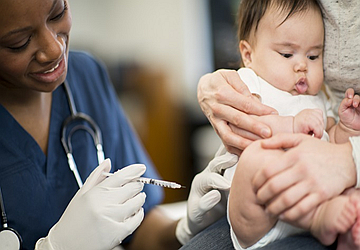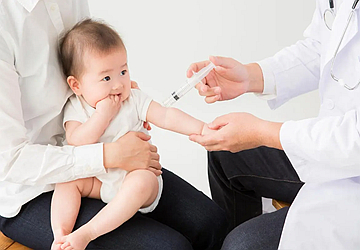Ease your worries and be informed. Our comprehensive 'Maternal Guide to Immunization' sheds light on what happens during infant vaccinations, ensuring you're prepared at every step. Let's embark on this journey of protecting your little one together.
Immunizations protect our children from harmful diseases, yet the process can often seem daunting for new parents. Our article, 'What Happens During Infant Vaccinations: Maternal Guide To Immunization,' is designed to demystify the process, provide insightful information, and help you navigate this significant step in your child's health journey with confidence.
From the types of vaccines to the schedule, potential side effects, and ways to comfort your baby, we've got you covered. Let's delve into this critical subject and arm ourselves with knowledge for the well-being of our precious little ones.

Understanding the Importance of Infant Immunizations
Regarding infant immunizations, it's natural to have questions about the vaccination process. The shots are typically administered by a trained health professional using a small, thin needle. The vaccines may be given in different areas of the body, most commonly the thigh or upper arm, depending on the age of your baby. It's normal for your baby to cry during the process, but the discomfort is momentary.
For many parents, seeing their little one in distress, even momentarily, can be challenging. Remember, however, that these baby shots protect your child from severe illnesses. Distraction techniques, like cuddling, breastfeeding, or using a pacifier, can comfort your baby during and after the shot.
The Vaccination Process: What to Expect
Vaccine adverse effects are often modest and short-lived. Injection-site redness or swelling, moderate temperature, irritability, and drowsiness are common adverse effects. Even though your child may be experiencing some discomfort, this is a sign that his or her immune system is working to prevent illness.
Severe reactions are uncommon but require prompt medical intervention. High body temperature, constant weeping, convulsions, and allergic reactions like hives are all examples. If you suspect something is wrong, you should contact your doctor immediately.
Baby Shots: Managing Comfort and Care
Babies often cry during and after baby shots, which is quite normal. Comfort your infant by holding them, nursing them, or giving them a pacifier. Minor side effects, such as fever, redness, or edema at the injection site, have been reported in some infants. These conditions are often mild and pass within two days. However, if you experience severe or unexpected symptoms, you should consult your doctor right away.
The Vaccine Schedule: A Timeline
The vaccine schedule is designed to provide the most effective protection against diseases. Some vaccines are administered in several doses at different ages to ensure complete immunity. Your healthcare provider typically provides a vaccination card or booklet with dates and details of your baby's shots. This schedule can initially seem overwhelming, but with time, it becomes an integral part of your child's healthcare routine.
Maternal Vaccination Advice: Navigating the Journey
As part of our maternal vaccination advice, it's important to remember that your peace of mind matters. Do your research, ask questions, and voice any concerns to your healthcare provider. This proactive approach will help you understand the immunization process and its importance better.
Additionally, keeping your child's vaccine records updated is crucial. This information is often required for school registration or travel. A well-maintained record informs you about your child's vaccination status and upcoming shots.

Specific Vaccines and Their Importance
Many vaccines, each designed to prevent a different illness, comprise the immunization schedule. Let's investigate many of them more closely:
● Hepatitis B vaccines are given at birth, 1–2 months, and 6–18 months to protect against a virus that targets the liver.
● DTaP is a combination vaccination that protects against diphtheria, tetanus, and acellular pertussis; it requires a series of five injections. It offers immunity to infections caused by bacteria, which can cause respiratory problems, muscle stiffness, and lockjaw.
● This vaccination protects against a bacterium that can cause life-threatening respiratory infections and meningitis; it's known as Hib (Haemophilus influenzae type B). Three or four shots are often administered.
● The polio (IPV) vaccine protects against the paralyzing poliovirus. It consists of four separate injections.
● Protect yourself from three contagious diseases with just one shot: MMR. Two doses are required, the first around the first birthday and the second just before starting school.
● Like the MMR vaccine, the varicella vaccine requires two doses to provide complete protection from chickenpox.
● The pneumococcal (PCV13) vaccination protects against a bacterium that can trigger infections in the respiratory system, circulatory system, and central nervous system. It consists of four separate injections.
Infants immunization and young children can be protected from a virus that can cause severe diarrhea by receiving an oral vaccine called rotavirus. It may require up to three administrations.
These are some of the vaccines that will be given to your child as part of the routine vaccination regimen.
Each one is essential in keeping your child healthy and stopping the spread of these diseases. Your doctor is the best person to talk to if you have questions or concerns about these immunizations. Your child will receive information and maternal vaccination guidance specific to his or her requirements.
Community Immunity: The Bigger Picture of Vaccination
Your community's health depends on your child's vaccines. Herd immunity, or community immunity, is crucial to understanding newborn immunizations. A community's herd immunity prevents the spread of disease. Because the disease cannot spread, even unvaccinated people like babies and those with chronic illnesses are protected.
Your child's vaccination schedule safeguard family, friends, and the community. This collective protection is crucial for protecting infants too young for immunizations and adults with specific health issues.
Remember that no vaccine is 100% effective, and infant immunizations might fade over time. Community immunity protects against potentially hazardous diseases. To conclude, infant immunizations have a bigger picture. It's about community health and child protection. It's a fantastic reminder of our interconnectedness and public health duty.
Conclusion
In conclusion, navigating the world of infant immunizations is a significant part of the parenting journey. It might seem daunting initially, but with the correct information and support, you can ensure your child's well-being and future health. Remember, vaccines are one of the best ways to protect your child from a range of severe and potentially fatal diseases.







